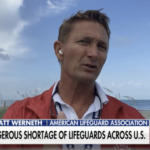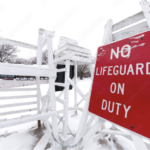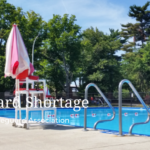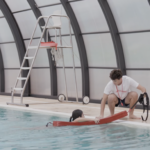Winter’s icy grip across the United States doesn’t just lower temperatures; it also diminishes the enthusiasm for lifeguard training in anticipation of the coming summer. The icy winds can freeze the very thought of mentally preparing for warmer days and securing the ideal summer job.
The chilly winter wraps your desire for lifeguard training in layers of ice. This mindset has created a significant gap, leading to a potential lifeguard shortage and, ultimately, the closure of many pools.
Summer Demands and Pool Shortages
Everyone eagerly awaits the warmer days to bask in the sun in their backyards and parks, enjoying nature’s warmer hues. At its peak, the warmer weather, accompanied by scorching heat, paints water as a savior. Pools and beaches become prime destinations for outdoor activities during summer.
As temperatures rise, the demand for certified lifeguards to ensure swimmer safety increases. Approximately 309,000 public pools await the return of warmer days and the presence of certified lifeguards to enliven them.
These pools transform into summer havens, drawing crowds seeking respite from the heat. However, the tendency to postpone lifeguard certification training until winter has passed means these facilities can’t operate at summer’s start.
The shortage of lifeguards has become a pressing issue, preventing pool openings and resulting in widespread closures. Without professional safety experts, symbolized by certified lifeguards, pools are forced to shut down, denying swimmers sites of relief and recreation.
Pandemic Fallout: The Reduced Lifeguard Force
The COVID-19 pandemic severely disrupted many aspects of life, including jobs. Lifeguard training, essential for ensuring public safety at aquatic facilities, was significantly affected. The pandemic led to a notable decline in certified lifeguards, contributing to pool closures.
As we emerge from the pandemic, the lifeguard shortage remains a stark challenge.
Race Against Time: Urgency in Training
With winter nearing its end, the urgency to replenish the lifeguard workforce intensifies. Waiting until winter’s conclusion to decide on lifeguard training could delay pool openings.
Shed your winter layers and dive into lifeguard classes. This not only prepares you for summer but also opens new career opportunities in a field with significant public demand.
Getting certified now greatly increases your employment prospects, as there’s an existing shortfall in qualified lifeguards. The opportunity to ensure community safety during the upcoming summer season is narrowing, demanding swift action.
Ripple Effect: Pool Closures and Unattended Beaches
Failure to address the lifeguard shortage promptly could lead to significant safety risks. Closed pools and unguarded beaches increase the potential for accidents, affecting not just local communities but anyone seeking leisure and relaxation at these venues.
Strategic Solutions: Overcoming Winter Hurdles
Winter weather shouldn’t deter lifeguard training efforts. Indoor facilities offer a conducive environment for aspiring lifeguards, ensuring a continuous supply of qualified individuals for the summer demand.
Community Engagement by Encouragement
Mobilizing community involvement can significantly mitigate pool closure issues. Encouraging community members to participate in lifeguard training and certification not only enhances public safety but also preserves the operation of pools and aquatic facilities.
The Imperative of Lifeguard Certification: A Call to Action
Facing the challenges of a cold winter, the focus on increasing certified lifeguards is crucial. Supporting training programs and certification efforts can address the looming shortage.
American Lifeguard Association: A Beacon of Hope
The American Lifeguard Association shines as a beacon in addressing the lifeguard shortage, offering world-class training to ensure an ample supply of certified lifeguards. Engaging with their programs is a step towards averting a potential crisis.
With more than a quarter million lifeguards trained globally, the ALA’s certification is renowned, highlighting its year-round commitment to combating the shortage and preventing pool closures.
In conclusion, the impact of winter weather on lifeguard training underscores the urgency of addressing the lifeguard shortage. Delaying training could compromise public safety. By acting now, communities can ensure a safe, enjoyable summer for everyone.







